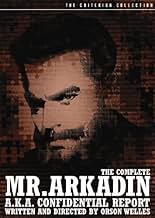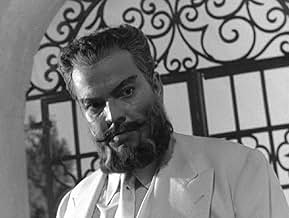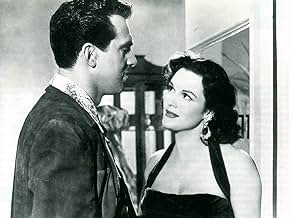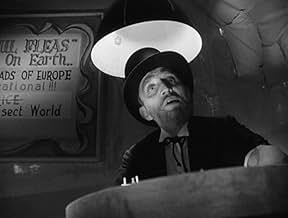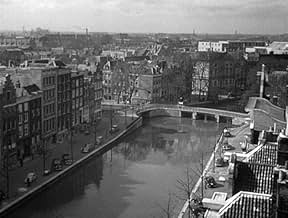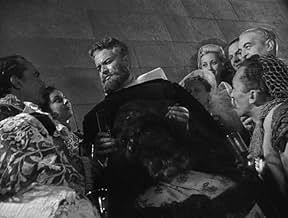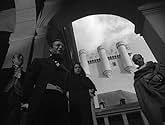An elusive billionaire hires an American smuggler to investigate his past, leading to a dizzying descent into a cold-war European landscape.An elusive billionaire hires an American smuggler to investigate his past, leading to a dizzying descent into a cold-war European landscape.An elusive billionaire hires an American smuggler to investigate his past, leading to a dizzying descent into a cold-war European landscape.
- Awards
- 1 nomination total
- Oscar
- (as O'Brady)
- Woman in Apartment
- (as Tamara Shane)
- Secretary
- (as Terence Langdon)
- Parisian Woman with Bread
- (as Annabel)
- First Munich Policeman
- (as Gert Frobe)
- Second Munich Policeman
- (as Eduard Linker)
Featured reviews
Mr Arkadin is a thriller about a man so afraid of losing his daughter's love and esteem he is willing to kill to maintain it. The story is pure genius: after an opening shot showing an empty aeroplane in mid-air, we flash back to a man found stabbed in the back. Hence Welles sets up two mysteries at once for us to think about. When the knifed man tells Arden's girlfriend two names that are worth a fortune, Van Stratten thinks to blackmail Mr Arkadin with this scant information. Arkadin calls his bluff, and instead confides in Van Stratten that back in 1927 he found himself in Prague wearing a suit with a lot of money in his pocket and no recollection of who he was or how he got there - total amnesia. He hires Van Stratten to find out who Mr Arkadin really is, and thus Van Stratten embarks on a voyage around Europe, trying to trace Arkadin's life back from 1927.
At each destination in Europe, Van Stratten finds Arkadin there too, so we learn that Arkadin has more on the mind than tracing his origins. And when the people Van Stratten interviews start dying, the suspense is shifted up another gear.
Were it not for the lame performance by Arden and the odd moment of awful dubbing, this flawed masterpiece may well have been held in as high esteem as Kane, Ambersons, Touch Of Evil and The Lady From Shanghai, rather than being relegated to Macbeth's 'interesting failure' status. Storytelling wise, this is Welles' at his best, and it's surreal, disturbing plot is more a meeting of The Lady From Shaghai and The Trial than Citizen Kane. Personally, I think this is a greater picture than Touch Of Evil's plain power-corrupts line and The Lady From Shaghai which depends on one high-concept set-piece after another.
Welles is a childhood hero. There's nothing rational about my feelings about Welles. If there are Welles fan boys, I admit to being one. But I have entertained the notion that I like Mr. Arkadin (also called Confidential Report, sometimes) as much as I do because it so completely betrays Welles as a titanic artist having to deal with the small frustrations and vicissitudes of Everyman. The bones of the thing, the behind the scene life of the film, the fact that the whole thing at one point passed through the man's hands shows through more than on any film he ever made. You actually see the customs stamps at the end of reels! His stratagems are more obvious, his resources more threadbare here than even Othello, his most legendary prolonged/disjointed/truncated shoot. Parts of it look shot on Super8; as good as some of it looks, at other times, the lighting doesn't feel professional (I am thinking of the nightclub and penitent procession scenes). In the end, I think Arkadin is the one completed and released Welles film that humanizes the man, without exactly bringing him low.
Clinching my interest in the film is Welles' comment, reiterated for different interviewers through the years, that Arkadin contained the best story he ever thought up to film. (He made a radio script of it first, and when he refined it for film, he saw fit to keep perhaps 95% intact from the radio play.) I may not agree with Welles' own appraisal of Arkadin as a story, but again, his comments betray perhaps more than intended: Welles' deep, and possibly irrational, feeling of attachment to this film. He said he considered it the most 'destroyed' film (destroyed by outside interference) he ever made. --Worse even than The Ambersons! I really think he never had "closure" with the experience of making Arkadin, and it continued to haunt him the rest of his days.
I invite you to take a look at it (it is available in many cheap public domain DVD versions) and see if you, too, fall under its spell. If it leaves you totally cold, or you can't take it seriously, I understand. But remember, better and worse DVD versions exist. Supposedly, the Criterion Collection will release it sometime in the next couple of years. That may be the version to make your definitive move with.
For those interested in investigating further, The Criterion Collection have done a wonderful 3 disc edition which collates all the available edits (including two Spanish versions which are known, hilariously, by the unexplained mis-crediting of the lead actor!?) and working them into a 'final' version hinted at by Welles' notes and conversations with the ubiquitous Peter Bogdanovich (who also features in the documentary, unsurprisingly). This 'final' version, while far from perfect, restores the original flashback structure as well as the original beginning and ending sequences. On the first disc, however, is the 'Corinth' version (originally discovered by Bogdanovich) that already incorporates some of the author's original intentions. This particular edit also features a highly illuminating commentary track by Welles scholars Jonathan Rosenbaum and James Naremore who consider this version to be the most satisfying. Also included are three mp3's of the aforementioned Harry Lime radio plays that had a direct influence on the story, featurettes by Welles biographer and actor Simon Callow, and a highly welcome reprint of the Mr. Arkadin novel (or novelisation? - you decide) with an excellent newly commissioned introduction by Robert Polito. All in all, this set is a must for the Welles aficionado and should be of interest to anyone with a true appreciation of cinema.
The fact that Arkadin connects closely to Kane or Quinlan is obvious and certainly interesting. Although it should seem obvious at this late date that Welles has patterns and themes that reoccur throughout his films. Does this fact still illuminate anything? If anybody questions the fact that Welles is an artist...well, this film will just add to their confusion. But for us believers this film can function like the ritual suffering of the penitents in the film. It hurts so good!
So while i know there is so much to admire in Arkadin, that each frame is aching with Wellesian visual beauty (which is closer to unusual/strangeness than classical beauty), i know that most people, especially Wellesian newbies, will find Arkadin inaccessible. The fact that it is quite difficult to follow, and its dialogue is often hard to understand, is made worse by the fact that its picture and soundtrack are in bad condition on all available video/dvd releases. The other notable thing about Arkadin is that it is available in different forms (like most Welles movies). Welles' initial Arkadin must have been quite disconcerting indeed. Like they usually did, the studio cut a fair portion of it, but still left it in its flashback form (which varies from one to two party scenes). Later on, someone, i don't know who, reordered Arkadin so it played out in chronological order. This is the version available for wide release in America, with Tony Curtis (for what reason i don't know) doing an introduction, and talking more about Kane than Arkadin. The only australian release of Arkadin at present seems to be the chronological one, so if i ever get my hands on the others i may write separate reviews on those.
And no it is not sufficient to sum Arkadin up as a poor remake of Kane. It has only superficial elements in common with Kane (mystery into true nature of old man, flashbacks), but visually it is nothing like Kane. I always put off watching it because i was upset by people's saying it was a poor man's Citizen Kane - but whoever said that can't have seen the same Arkadin i did.
For Welles fans there is so much to marvel at. It is one brilliant, original frame after another. I just couldn't watch it slow enough. I had to pause it about every ten seconds to wind back and watch something again and go "oooh" and "aaah." It also has sexy Patricia Medina and a great score.
Some favourite scenes:
The tracking back shot of Van Stratten (Robert Arden) going up the steps to Zouk's place (Akim Tamiroff).
The scenes of snow falling outside Zouk's place.
Every scene where Van Stratten is interviewing an eccentric character from Arkadin's past. All are such wonderful scenes. Especially the flea circus master scene.
The rocking boat scene is incredible. The sexual energy of voluptuous, erect-nippled Patricia Medina, stumbling around the room, giggling and taunting Arkadin as the rocking boat mirrors the shakiness of her drunken state.
There is a magestic tracking shot in the party scene, which takes place in a sort of ballroom resembling the Ambersons' ballroom, where i believe Welles almost made up for the studio's cutting up a similar sweeping unbroken tracking shot through the room in the ballroom scene in Magnificent Ambersons.
Did you know
- TriviaThe voices of Mischa Auer (The Professor) and Frédéric O'Brady (Oscar) were dubbed by writer, producer, and director Orson Welles.
- GoofsOrson Welles' prosthetic nose disappears when Arkadin meets with Jakob Zouk.
- Quotes
Gregory Arkadin: And now I'm going to tell you about a scorpion. This scorpion wanted to cross a river, so he asked the frog to carry him. No, said the frog, no thank you. If I let you on my back you may sting me and the sting of the scorpion is death. Now, where, asked the scorpion, is the logic in that? For scorpions always try to be logical. If I sting you, you will die. I will drown. So, the frog was convinced and allowed the scorpion on his back. But, just in the middle of the river, he felt a terrible pain and realized that, after all, the scorpion had stung him. Logic! Cried the dying frog as he started under, bearing the scorpion down with him. There is no logic in this! I know, said the scorpion, but I can't help it - it's my character. Let's drink to character.
- ConnectionsEdited into Histoire(s) du cinéma: Fatale beauté (1994)
- SoundtracksSaeta
Performed by Antoñita Moreno.
- How long is Confidential Report?Powered by Alexa
Details
Box office
- Gross worldwide
- $4,528
- Runtime
- 1h 33m(93 min)
- Color
- Aspect ratio
- 1.37 : 1

